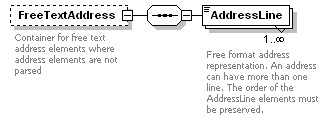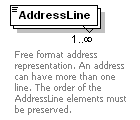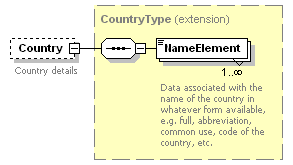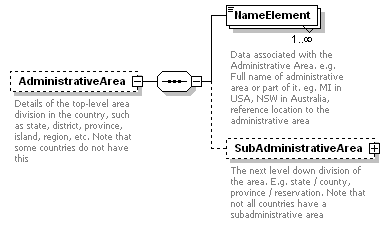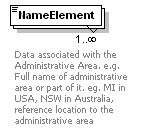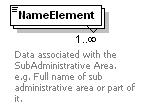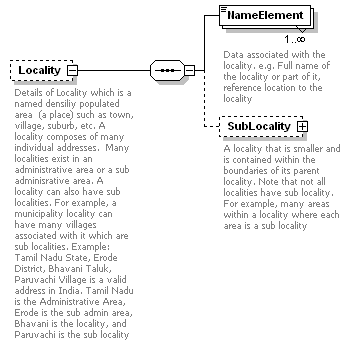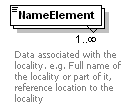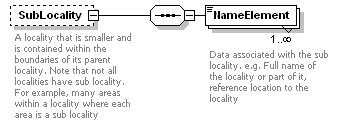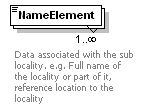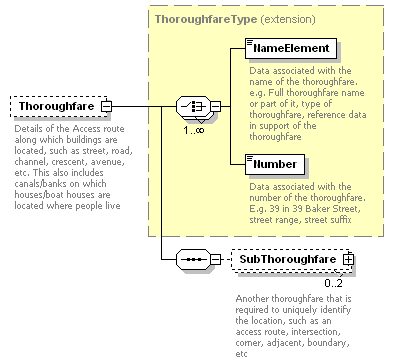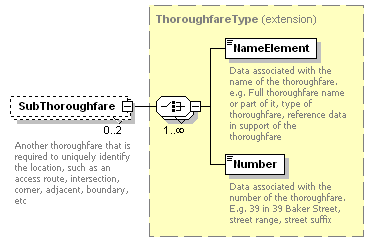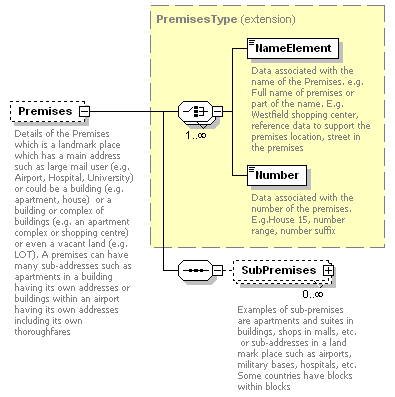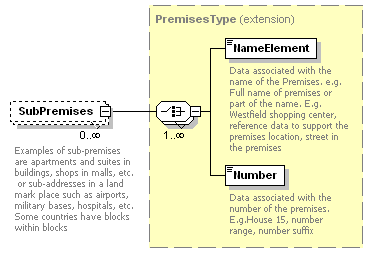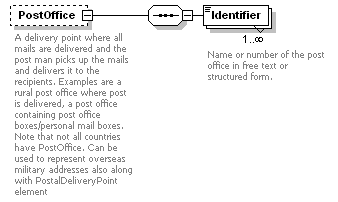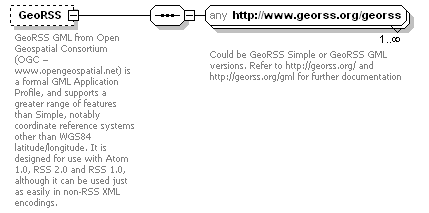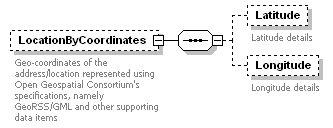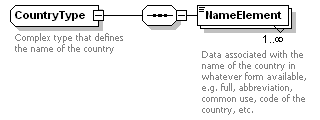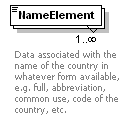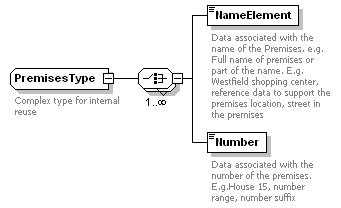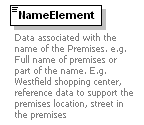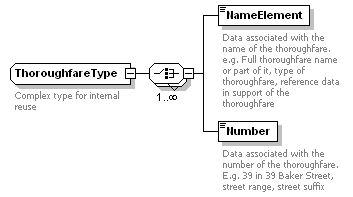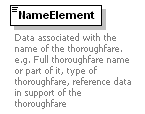| attributes |
| Name | Type | Use | Default | Fixed | annotation | | Type | ct:CodeType | | | | | documentation | | Defines the type of address. An address type can be" Primary Address, Secondary Address, Rural Address, Military Address, etc. |
| | TypeRef | xs:normalizedString | | | | | documentation |
Corresponding to genericode ShortName meta data.
|
| | TypeVer | xs:normalizedString | | | | | documentation |
Corresponding to genericode Version meta data.
|
| | TypeURI | xs:normalizedString | | | | | documentation |
Corresponding to genericode CanonicalUri meta data.
|
| | TypeVerURI | xs:normalizedString | | | | | documentation |
Corresponding to genericode CanonicalVersionUri meta data.
|
| | Status | ct:CodeType | | | | | documentation | | Status of the entity. e.g. Old, Current, Inactive, Active, etc |
| | StatusTypeRef | xs:normalizedString | | | | | documentation |
Corresponding to genericode ShortName meta data.
|
| | StatusTypeVer | xs:normalizedString | | | | | documentation |
Corresponding to genericode Version meta data.
|
| | StatusTypeURI | xs:normalizedString | | | | | documentation |
Corresponding to genericode CanonicalUri meta data.
|
| | StatusTypeVerURI | xs:normalizedString | | | | | documentation |
Corresponding to genericode CanonicalVersionUri meta data.
|
| | StartDate | xs:dateTime | | | | | documentation | | Could be start date, issue date, validity start date, etc |
| | FinishDate | xs:dateTime | | | | | documentation | | Could be end date, expiry date, validity end date, etc |
| | Usage | ct:CodeType | | | | | documentation | | The purpose the address is used for. E.g. Postal, residential, business, etc |
| | UsageTypeRef | xs:normalizedString | | | | | documentation |
Corresponding to genericode ShortName meta data.
|
| | UsageTypeVer | xs:normalizedString | | | | | documentation |
Corresponding to genericode Version meta data.
|
| | UsageTypeURI | xs:normalizedString | | | | | documentation |
Corresponding to genericode CanonicalUri meta data.
|
| | UsageTypeVerURI | xs:normalizedString | | | | | documentation |
Corresponding to genericode CanonicalVersionUri meta data.
|
| | ID | xs:string | | | | | documentation | | A globally unique identifier assigned to the address |
| | AddressID | ct:String | | | | | documentation | | A unique address identifier such as postal delivery idetifier assigned to the address by local postal authority, e.g. DPID in Australia. |
| | AddressIDType | ct:CodeType | | | | | documentation | | Type of address ID used. e.g. DPID, etc |
| | AddressIDTypeRef | xs:normalizedString | | | | | documentation |
Corresponding to genericode ShortName meta data.
|
| | AddressIDTypeVer | xs:normalizedString | | | | | documentation |
Corresponding to genericode Version meta data.
|
| | AddressIDTypeURI | xs:normalizedString | | | | | documentation |
Corresponding to genericode CanonicalUri meta data.
|
| | AddressIDTypeVerURI | xs:normalizedString | | | | | documentation |
Corresponding to genericode CanonicalVersionUri meta data.
|
| | AddressKeyRef | ct:String | | | | | documentation | | Key identifier for the element for not reinforced references from other elements. Not required to be unique for the document to be valid, but application may get confused if not unique. Extend this schema adding unique contraint if needed. |
| | DataQualityType | ct:CodeType | | | | | documentation | | This attribute indicates what level of trust can be given to the parent element. Omit this attribute if the data quality is unknown. If the data quality is known, the value is "Valid, else "InValid" |
| | ValidFrom | xs:dateTime | | | | | documentation | | Period the data quality is valid from |
| | ValidTo | xs:dateTime | | | | | documentation | | Period the data quality is valid to |
| | DataQualityTypeRef | xs:normalizedString | | | | | documentation |
Corresponding to genericode ShortName meta data.
|
| | DataQualityTypeVer | xs:normalizedString | | | | | documentation |
Corresponding to genericode Version meta data.
|
| | DataQualityTypeURI | xs:normalizedString | | | | | documentation |
Corresponding to genericode CanonicalUri meta data.
|
| | DataQualityTypeVerURI | xs:normalizedString | | | | | documentation |
Corresponding to genericode CanonicalVersionUri meta data.
|
| | xlink:type | | | | | | | xlink:label | | | | | | | xlink:href | | | | | | | LanguageCode | xs:language | | | | | documentation | | Human Language used. e.g. "en", "en-US", "en-AUS", etc |
|
|
| source |
<xs:complexType name="AddressType">
<xs:annotation>
<xs:documentation>Complex type that defines the structure of an address without geocode details for reuse</xs:documentation>
</xs:annotation>
<xs:all>
<xs:element name="FreeTextAddress" minOccurs="0">
<xs:annotation>
<xs:documentation>Container for free text address elements where address elements are not parsed </xs:documentation>
</xs:annotation>
<xs:complexType>
<xs:sequence>
<xs:element name="AddressLine" maxOccurs="unbounded">
<xs:annotation>
<xs:documentation>Free format address representation. An address can have more than one line. The order of the AddressLine elements must be preserved.</xs:documentation>
</xs:annotation>
<xs:complexType>
<xs:simpleContent>
<xs:extension base="ct:String">
<xs:attribute name="Type" type="ct:CodeType">
<xs:annotation>
<xs:documentation>Free text description of the information type specified by the element. E.g. state and post code details, street details, etc</xs:documentation>
</xs:annotation>
</xs:attribute>
<xs:attributeGroup ref="ct:grTypeMetaData"/>
<xs:anyAttribute namespace="##other" processContents="lax"/>
</xs:extension>
</xs:simpleContent>
</xs:complexType>
</xs:element>
</xs:sequence>
<xs:attributeGroup ref="ct:grDataQuality"/>
<xs:attributeGroup ref="ct:grDataQualityTypeMetaData"/>
<xs:anyAttribute namespace="##other" processContents="lax"/>
</xs:complexType>
</xs:element>
<xs:element name="Country" minOccurs="0">
<xs:annotation>
<xs:documentation>Country details</xs:documentation>
</xs:annotation>
<xs:complexType>
<xs:complexContent>
<xs:extension base="CountryType"/>
</xs:complexContent>
</xs:complexType>
</xs:element>
<xs:element name="AdministrativeArea" minOccurs="0">
<xs:annotation>
<xs:documentation>Details of the top-level area division in the country, such as state, district, province, island, region, etc. Note that some countries do not have this</xs:documentation>
</xs:annotation>
<xs:complexType>
<xs:sequence>
<xs:element name="NameElement" maxOccurs="unbounded">
<xs:annotation>
<xs:documentation>Data associated with the Administrative Area. e.g. Full name of administrative area or part of it. eg. MI in USA, NSW in Australia, reference location to the administrative area</xs:documentation>
</xs:annotation>
<xs:complexType>
<xs:complexContent>
<xs:extension base="NameType">
<xs:attribute name="NameType" type="ct:CodeType">
<xs:annotation>
<xs:documentation>semantics of data associated with name</xs:documentation>
</xs:annotation>
</xs:attribute>
<xs:attributeGroup ref="ct:grNameTypeMetaData"/>
<xs:attribute name="NameCode" type="ct:CodeType">
<xs:annotation>
<xs:documentation>Name of administrative area represented as a code. e.g. "COL" for COLORADO</xs:documentation>
</xs:annotation>
</xs:attribute>
<xs:attributeGroup ref="ct:grNameCodeTypeMetaData"/>
<xs:attribute name="NameCodeType" type="ct:String">
<xs:annotation>
<xs:documentation>Type of code used to represent name as a code</xs:documentation>
</xs:annotation>
</xs:attribute>
</xs:extension>
</xs:complexContent>
</xs:complexType>
</xs:element>
<xs:element name="SubAdministrativeArea" minOccurs="0">
<xs:annotation>
<xs:documentation>The next level down division of the area. E.g. state / county, province / reservation. Note that not all countries have a subadministrative area</xs:documentation>
</xs:annotation>
<xs:complexType>
<xs:sequence>
<xs:element name="NameElement" maxOccurs="unbounded">
<xs:annotation>
<xs:documentation>Data associated with the SubAdministrative Area. e.g. Full name of sub administrative area or part of it. </xs:documentation>
</xs:annotation>
<xs:complexType>
<xs:complexContent>
<xs:extension base="NameType">
<xs:attribute name="NameType" type="ct:CodeType">
<xs:annotation>
<xs:documentation>semantics of data associated with name</xs:documentation>
</xs:annotation>
</xs:attribute>
<xs:attributeGroup ref="ct:grNameTypeMetaData"/>
<xs:attribute name="NameCode" type="ct:CodeType">
<xs:annotation>
<xs:documentation>Name of administrative area represented as a code. e.g. "COL" for COLORADO</xs:documentation>
</xs:annotation>
</xs:attribute>
<xs:attributeGroup ref="ct:grNameCodeTypeMetaData"/>
<xs:attribute name="NameCodeType" type="ct:String">
<xs:annotation>
<xs:documentation>Type of code used to represent name as a code</xs:documentation>
</xs:annotation>
</xs:attribute>
</xs:extension>
</xs:complexContent>
</xs:complexType>
</xs:element>
</xs:sequence>
<xs:attributeGroup ref="ct:grDataQuality"/>
<xs:attributeGroup ref="ct:grDataQualityTypeMetaData"/>
<xs:attribute name="Type" type="ct:CodeType">
<xs:annotation>
<xs:documentation>Type of sub administrative area</xs:documentation>
</xs:annotation>
</xs:attribute>
<xs:attributeGroup ref="ct:grTypeMetaData"/>
<xs:anyAttribute namespace="##other" processContents="lax"/>
</xs:complexType>
</xs:element>
</xs:sequence>
<xs:attributeGroup ref="ct:grDataQuality"/>
<xs:attributeGroup ref="ct:grDataQualityTypeMetaData"/>
<xs:attribute name="Type" type="ct:CodeType">
<xs:annotation>
<xs:documentation>Type of administrative area. e.g. state, city, town, etc</xs:documentation>
</xs:annotation>
</xs:attribute>
<xs:attributeGroup ref="ct:grTypeMetaData"/>
<xs:anyAttribute namespace="##other" processContents="lax"/>
</xs:complexType>
</xs:element>
<xs:element name="Locality" minOccurs="0">
<xs:annotation>
<xs:documentation>Details of Locality which is a named densiliy populated area (a place) such as town, village, suburb, etc. A locality composes of many individual addresses. Many localities exist in an administrative area or a sub adminisrative area. A locality can also have sub localities. For example, a municipality locality can have many villages associated with it which are sub localities. Example: Tamil Nadu State, Erode District, Bhavani Taluk, Paruvachi Village is a valid address in India. Tamil Nadu is the Administrative Area, Erode is the sub admin area, Bhavani is the locality, and Paruvachi is the sub locality</xs:documentation>
</xs:annotation>
<xs:complexType>
<xs:sequence>
<xs:element name="NameElement" maxOccurs="unbounded">
<xs:annotation>
<xs:documentation>Data associated with the locality. e.g. Full name of the locality or part of it, reference location to the locality</xs:documentation>
</xs:annotation>
<xs:complexType>
<xs:complexContent>
<xs:extension base="NameType">
<xs:attribute name="NameType" type="ct:CodeType">
<xs:annotation>
<xs:documentation>semantics of data associated with name</xs:documentation>
</xs:annotation>
</xs:attribute>
<xs:attributeGroup ref="ct:grNameTypeMetaData"/>
<xs:attribute name="NameCode" type="ct:CodeType">
<xs:annotation>
<xs:documentation>name of locality represented as a code</xs:documentation>
</xs:annotation>
</xs:attribute>
<xs:attributeGroup ref="ct:grNameCodeTypeMetaData"/>
<xs:attribute name="NameCodeType" type="ct:String">
<xs:annotation>
<xs:documentation>type of code used to represent name as a code</xs:documentation>
</xs:annotation>
</xs:attribute>
</xs:extension>
</xs:complexContent>
</xs:complexType>
</xs:element>
<xs:element name="SubLocality" minOccurs="0">
<xs:annotation>
<xs:documentation>A locality that is smaller and is contained within the boundaries of its parent locality. Note that not all localities have sub locality. For example, many areas within a locality where each area is a sub locality</xs:documentation>
</xs:annotation>
<xs:complexType>
<xs:sequence>
<xs:element name="NameElement" maxOccurs="unbounded">
<xs:annotation>
<xs:documentation>Data associated with the sub locality. e.g. Full name of the locality or part of it, reference location to the locality</xs:documentation>
</xs:annotation>
<xs:complexType>
<xs:complexContent>
<xs:extension base="NameType">
<xs:attribute name="NameType" type="ct:CodeType">
<xs:annotation>
<xs:documentation>semantics of data associated with name</xs:documentation>
</xs:annotation>
</xs:attribute>
<xs:attributeGroup ref="ct:grNameTypeMetaData"/>
<xs:attribute name="NameCode" type="ct:CodeType">
<xs:annotation>
<xs:documentation>name of locality represented as a code</xs:documentation>
</xs:annotation>
</xs:attribute>
<xs:attributeGroup ref="ct:grNameCodeTypeMetaData"/>
<xs:attribute name="NameCodeType" type="ct:String">
<xs:annotation>
<xs:documentation>type of code used to represent name as a code</xs:documentation>
</xs:annotation>
</xs:attribute>
</xs:extension>
</xs:complexContent>
</xs:complexType>
</xs:element>
</xs:sequence>
<xs:attributeGroup ref="ct:grDataQuality"/>
<xs:attributeGroup ref="ct:grDataQualityTypeMetaData"/>
<xs:attribute name="Type" type="ct:CodeType">
<xs:annotation>
<xs:documentation>Type of sub locality</xs:documentation>
</xs:annotation>
</xs:attribute>
<xs:attributeGroup ref="ct:grTypeMetaData"/>
<xs:anyAttribute namespace="##other" processContents="lax"/>
</xs:complexType>
</xs:element>
</xs:sequence>
<xs:attributeGroup ref="ct:grDataQuality"/>
<xs:attributeGroup ref="ct:grDataQualityTypeMetaData"/>
<xs:attribute name="Type" type="ct:CodeType">
<xs:annotation>
<xs:documentation>Type of locality. e.g. suburb, area, zone, village, etc</xs:documentation>
</xs:annotation>
</xs:attribute>
<xs:attributeGroup ref="ct:grTypeMetaData"/>
<xs:anyAttribute namespace="##other" processContents="lax"/>
</xs:complexType>
</xs:element>
<xs:element name="Thoroughfare" minOccurs="0">
<xs:annotation>
<xs:documentation>Details of the Access route along which buildings are located, such as street, road, channel, crescent, avenue, etc. This also includes canals/banks on which houses/boat houses are located where people live</xs:documentation>
</xs:annotation>
<xs:complexType>
<xs:complexContent>
<xs:extension base="ThoroughfareType">
<xs:sequence>
<xs:element name="SubThoroughfare" minOccurs="0" maxOccurs="2">
<xs:annotation>
<xs:documentation>Another thoroughfare that is required to uniquely identify the location, such as an access route, intersection, corner, adjacent, boundary, etc</xs:documentation>
</xs:annotation>
<xs:complexType>
<xs:complexContent>
<xs:extension base="ThoroughfareType"/>
</xs:complexContent>
</xs:complexType>
</xs:element>
</xs:sequence>
</xs:extension>
</xs:complexContent>
</xs:complexType>
</xs:element>
<xs:element name="Premises" minOccurs="0">
<xs:annotation>
<xs:documentation>Details of the Premises which is a landmark place which has a main address such as large mail user (e.g. Airport, Hospital, University) or could be a building (e.g. apartment, house) or a building or complex of buildings (e.g. an apartment complex or shopping centre) or even a vacant land (e.g. LOT). A premises can have many sub-addresses such as apartments in a building having its own addresses or buildings within an airport having its own addresses including its own thoroughfares</xs:documentation>
</xs:annotation>
<xs:complexType>
<xs:complexContent>
<xs:extension base="PremisesType">
<xs:sequence>
<xs:element name="SubPremises" minOccurs="0" maxOccurs="unbounded">
<xs:annotation>
<xs:documentation>Examples of sub-premises are apartments and suites in buildings, shops in malls, etc. or sub-addresses in a land mark place such as airports, military bases, hospitals, etc. Some countries have blocks within blocks</xs:documentation>
</xs:annotation>
<xs:complexType>
<xs:complexContent>
<xs:extension base="PremisesType">
<xs:attribute name="Type" type="ct:CodeType"/>
<xs:attributeGroup ref="ct:grTypeMetaData"/>
<xs:attribute name="TypeCode" type="ct:String">
<xs:annotation>
<xs:documentation>Type of code used for sub premises type attribute</xs:documentation>
</xs:annotation>
</xs:attribute>
</xs:extension>
</xs:complexContent>
</xs:complexType>
</xs:element>
</xs:sequence>
<xs:attribute name="Type" type="ct:CodeType"/>
<xs:attributeGroup ref="ct:grTypeMetaData"/>
<xs:attribute name="TypeCode" type="ct:String">
<xs:annotation>
<xs:documentation>Type of code use for Premises Type attribute</xs:documentation>
</xs:annotation>
</xs:attribute>
</xs:extension>
</xs:complexContent>
</xs:complexType>
</xs:element>
<xs:element name="PostCode" minOccurs="0">
<xs:annotation>
<xs:documentation>A container for a single free text or structured postcode. Note that not all countries have post codes</xs:documentation>
</xs:annotation>
<xs:complexType>
<xs:sequence>
<xs:element name="Identifier" type="IdentifierType" maxOccurs="unbounded">
<xs:annotation>
<xs:documentation>The postcode is formatted according to country-specific rules. Example: SW3 0A8-1A, 600074, 2067</xs:documentation>
</xs:annotation>
</xs:element>
</xs:sequence>
<xs:attributeGroup ref="ct:grDataQuality"/>
<xs:attributeGroup ref="ct:grDataQualityTypeMetaData"/>
<xs:anyAttribute namespace="##other"/>
</xs:complexType>
</xs:element>
<xs:element name="RuralDelivery" minOccurs="0">
<xs:annotation>
<xs:documentation>A container for postal-specific delivery identifier for remote communities. Note that not all countries have RuralDelivery</xs:documentation>
</xs:annotation>
<xs:complexType>
<xs:sequence>
<xs:element name="Identifier" type="IdentifierType" maxOccurs="unbounded">
<xs:annotation>
<xs:documentation>Free text or structured description of rural delivery rout.</xs:documentation>
</xs:annotation>
</xs:element>
</xs:sequence>
<xs:attributeGroup ref="ct:grDataQuality"/>
<xs:attributeGroup ref="ct:grDataQualityTypeMetaData"/>
<xs:attribute name="Type" type="ct:CodeType">
<xs:annotation>
<xs:documentation>Type of rural delivery. For some addresses, delivery to rural areas happens via water, air or road</xs:documentation>
</xs:annotation>
</xs:attribute>
<xs:attributeGroup ref="ct:grTypeMetaData"/>
<xs:anyAttribute namespace="##other"/>
</xs:complexType>
</xs:element>
<xs:element name="PostalDeliveryPoint" minOccurs="0">
<xs:annotation>
<xs:documentation>Final mail delivery point where the mail is dropped off for recipients to pick them up directly. E.g. POBox, Private Bag, pigeon hole, free mail numbers, etc.</xs:documentation>
</xs:annotation>
<xs:complexType>
<xs:sequence>
<xs:element name="Identifier" type="IdentifierType" maxOccurs="unbounded">
<xs:annotation>
<xs:documentation>Free text or structured description of a postal delivery point.</xs:documentation>
</xs:annotation>
</xs:element>
</xs:sequence>
<xs:attribute name="Type" type="ct:CodeType"/>
<xs:attributeGroup ref="ct:grTypeMetaData"/>
<xs:attributeGroup ref="ct:grDataQuality"/>
<xs:attributeGroup ref="ct:grDataQualityTypeMetaData"/>
<xs:anyAttribute namespace="##other"/>
</xs:complexType>
</xs:element>
<xs:element name="PostOffice" minOccurs="0">
<xs:annotation>
<xs:documentation>A delivery point where all mails are delivered and the post man picks up the mails and delivers it to the recipients. Examples are a rural post office where post is delivered, a post office containing post office boxes/personal mail boxes. Note that not all countries have PostOffice. Can be used to represent overseas military addresses also along with PostalDeliveryPoint element</xs:documentation>
</xs:annotation>
<xs:complexType>
<xs:sequence>
<xs:element name="Identifier" type="IdentifierType" maxOccurs="unbounded">
<xs:annotation>
<xs:documentation>Name or number of the post office in free text or structured form.</xs:documentation>
</xs:annotation>
</xs:element>
</xs:sequence>
<xs:attributeGroup ref="ct:grDataQuality"/>
<xs:attributeGroup ref="ct:grDataQualityTypeMetaData"/>
<xs:anyAttribute namespace="##other"/>
</xs:complexType>
</xs:element>
<xs:element name="GeoRSS" minOccurs="0">
<xs:annotation>
<xs:documentation>GeoRSS GML from Open Geospatial Consortium (OGC – www.opengeospatial.net) is a formal GML Application Profile, and supports a greater range of features than Simple, notably coordinate reference systems other than WGS84 latitude/longitude. It is designed for use with Atom 1.0, RSS 2.0 and RSS 1.0, although it can be used just as easily in non-RSS XML encodings. </xs:documentation>
</xs:annotation>
<xs:complexType>
<xs:sequence>
<xs:any namespace="http://www.georss.org/georss" maxOccurs="unbounded">
<xs:annotation>
<xs:documentation>Could be GeoRSS Simple or GeoRSS GML versions. Refer to http://georss.org/ and http://georss.org/gml for further documentation</xs:documentation>
</xs:annotation>
</xs:any>
</xs:sequence>
<xs:anyAttribute namespace="##other" processContents="lax"/>
</xs:complexType>
</xs:element>
<xs:element name="LocationByCoordinates" minOccurs="0">
<xs:annotation>
<xs:documentation>Geo-coordinates of the address/location represented using Open Geospatial Consortium's specifications, namely GeoRSS/GML and other supporting data items</xs:documentation>
</xs:annotation>
<xs:complexType>
<xs:sequence>
<xs:element name="Latitude" minOccurs="0">
<xs:annotation>
<xs:documentation>Latitude details</xs:documentation>
</xs:annotation>
<xs:complexType>
<xs:attribute name="DegreesMeasure" type="ct:String">
<xs:annotation>
<xs:documentation>Measure of the latitude in degrees</xs:documentation>
</xs:annotation>
</xs:attribute>
<xs:attribute name="MinutesMeasure" type="ct:String">
<xs:annotation>
<xs:documentation>Measure of the latitude in minutes</xs:documentation>
</xs:annotation>
</xs:attribute>
<xs:attribute name="SecondsMeasure" type="ct:String">
<xs:annotation>
<xs:documentation>Measure of the latitude in seconds</xs:documentation>
</xs:annotation>
</xs:attribute>
<xs:attribute name="Direction" type="ct:CodeType">
<xs:annotation>
<xs:documentation>The direction of latitude measurement offset from the equator</xs:documentation>
</xs:annotation>
</xs:attribute>
<xs:attribute name="DirectionTypeRef" type="xs:normalizedString">
<xs:annotation>
<xs:documentation>
Corresponding to genericode ShortName meta data.
</xs:documentation>
</xs:annotation>
</xs:attribute>
<xs:attribute name="DirectionTypeVer" type="xs:normalizedString">
<xs:annotation>
<xs:documentation>
Corresponding to genericode Version meta data.
</xs:documentation>
</xs:annotation>
</xs:attribute>
<xs:attribute name="DirectionTypeURI" type="xs:normalizedString">
<xs:annotation>
<xs:documentation>
Corresponding to genericode CanonicalUri meta data.
</xs:documentation>
</xs:annotation>
</xs:attribute>
<xs:attribute name="DirectionTypeVerURI" type="xs:normalizedString">
<xs:annotation>
<xs:documentation>
Corresponding to genericode CanonicalVersionUri meta data.
</xs:documentation>
</xs:annotation>
</xs:attribute>
<xs:anyAttribute namespace="##other" processContents="lax"/>
</xs:complexType>
</xs:element>
<xs:element name="Longitude" minOccurs="0">
<xs:annotation>
<xs:documentation>Longitude details</xs:documentation>
</xs:annotation>
<xs:complexType>
<xs:attribute name="DegreesMeasure" type="ct:String">
<xs:annotation>
<xs:documentation>Measure of the longitude in degrees</xs:documentation>
</xs:annotation>
</xs:attribute>
<xs:attribute name="MinutesMeasure" type="ct:String">
<xs:annotation>
<xs:documentation>Measure of the longitude in minutes</xs:documentation>
</xs:annotation>
</xs:attribute>
<xs:attribute name="SecondsMeasure" type="ct:String">
<xs:annotation>
<xs:documentation>Measure of the longitude in seconds</xs:documentation>
</xs:annotation>
</xs:attribute>
<xs:attribute name="Direction" type="ct:CodeType">
<xs:annotation>
<xs:documentation>The direction of longitude measurement offset from the equator</xs:documentation>
</xs:annotation>
</xs:attribute>
<xs:attribute name="DirectionTypeRef" type="xs:normalizedString">
<xs:annotation>
<xs:documentation>
Corresponding to genericode ShortName meta data.
</xs:documentation>
</xs:annotation>
</xs:attribute>
<xs:attribute name="DirectionTypeVer" type="xs:normalizedString">
<xs:annotation>
<xs:documentation>
Corresponding to genericode Version meta data.
</xs:documentation>
</xs:annotation>
</xs:attribute>
<xs:attribute name="DirectionTypeURI" type="xs:normalizedString">
<xs:annotation>
<xs:documentation>
Corresponding to genericode CanonicalUri meta data.
</xs:documentation>
</xs:annotation>
</xs:attribute>
<xs:attribute name="DirectionTypeVerURI" type="xs:normalizedString">
<xs:annotation>
<xs:documentation>
Corresponding to genericode CanonicalVersionUri meta data.
</xs:documentation>
</xs:annotation>
</xs:attribute>
<xs:anyAttribute namespace="##other" processContents="lax"/>
</xs:complexType>
</xs:element>
</xs:sequence>
<xs:attributeGroup ref="ct:grDataQuality"/>
<xs:attributeGroup ref="ct:grDataQualityTypeMetaData"/>
<xs:attribute name="Meridian" type="ct:CodeType">
<xs:annotation>
<xs:documentation>The collection of the coordinate numeric values for latitude amd longtitude depends on the agreed position of the meridian. Declaration of the meridian is necessary as it cannot be assumed in the data</xs:documentation>
</xs:annotation>
</xs:attribute>
<xs:attribute name="MeridianTypeRef" type="xs:normalizedString">
<xs:annotation>
<xs:documentation>
Corresponding to genericode ShortName meta data.
</xs:documentation>
</xs:annotation>
</xs:attribute>
<xs:attribute name="MeridianTypeVer" type="xs:normalizedString">
<xs:annotation>
<xs:documentation>
Corresponding to genericode Version meta data.
</xs:documentation>
</xs:annotation>
</xs:attribute>
<xs:attribute name="MeridianTypeURI" type="xs:normalizedString">
<xs:annotation>
<xs:documentation>
Corresponding to genericode CanonicalUri meta data.
</xs:documentation>
</xs:annotation>
</xs:attribute>
<xs:attribute name="MeridianTypeVerURI" type="xs:normalizedString">
<xs:annotation>
<xs:documentation>
Corresponding to genericode CanonicalVersionUri meta data.
</xs:documentation>
</xs:annotation>
</xs:attribute>
<xs:attribute name="MeridianCodeType" type="ct:String">
<xs:annotation>
<xs:documentation>Type of code used. e.g. EPSG Code</xs:documentation>
</xs:annotation>
</xs:attribute>
<xs:attribute name="Datum" type="ct:CodeType">
<xs:annotation>
<xs:documentation>The collection of the coordinate numeric values depends on the agreed datum within which the measurement was taken. Declaration of the datum is necessary as it cannot be assumed in the data</xs:documentation>
</xs:annotation>
</xs:attribute>
<xs:attribute name="DatumTypeRef" type="xs:normalizedString">
<xs:annotation>
<xs:documentation>
Corresponding to genericode ShortName meta data.
</xs:documentation>
</xs:annotation>
</xs:attribute>
<xs:attribute name="DatumTypeVer" type="xs:normalizedString">
<xs:annotation>
<xs:documentation>
Corresponding to genericode Version meta data.
</xs:documentation>
</xs:annotation>
</xs:attribute>
<xs:attribute name="DatumTypeURI" type="xs:normalizedString">
<xs:annotation>
<xs:documentation>
Corresponding to genericode CanonicalUri meta data.
</xs:documentation>
</xs:annotation>
</xs:attribute>
<xs:attribute name="DatumTypeVerURI" type="xs:normalizedString">
<xs:annotation>
<xs:documentation>
Corresponding to genericode CanonicalVersionUri meta data.
</xs:documentation>
</xs:annotation>
</xs:attribute>
<xs:attribute name="DatumCodeType" type="ct:String">
<xs:annotation>
<xs:documentation>Type of code used. e.g. EPSG Code, WGS-84</xs:documentation>
</xs:annotation>
</xs:attribute>
<xs:attribute name="Projection" type="ct:CodeType">
<xs:annotation>
<xs:documentation>Coordinates have limited utility and application depending on the projection required for visualisation in a map. Declaration of projection is necessary as it cannot be assumed in data</xs:documentation>
</xs:annotation>
</xs:attribute>
<xs:attribute name="ProjectionTypeRef" type="xs:normalizedString">
<xs:annotation>
<xs:documentation>
Corresponding to genericode ShortName meta data.
</xs:documentation>
</xs:annotation>
</xs:attribute>
<xs:attribute name="ProjectionTypeVer" type="xs:normalizedString">
<xs:annotation>
<xs:documentation>
Corresponding to genericode Version meta data.
</xs:documentation>
</xs:annotation>
</xs:attribute>
<xs:attribute name="ProjectionTypeURI" type="xs:normalizedString">
<xs:annotation>
<xs:documentation>
Corresponding to genericode CanonicalUri meta data.
</xs:documentation>
</xs:annotation>
</xs:attribute>
<xs:attribute name="ProjectionTypeVerURI" type="xs:normalizedString">
<xs:annotation>
<xs:documentation>
Corresponding to genericode CanonicalVersionUri meta data.
</xs:documentation>
</xs:annotation>
</xs:attribute>
<xs:attribute name="ProjectionCodeType" type="ct:String">
<xs:annotation>
<xs:documentation>Type of code used. e.g. EPSG Code</xs:documentation>
</xs:annotation>
</xs:attribute>
<xs:anyAttribute namespace="##other" processContents="lax"/>
</xs:complexType>
</xs:element>
</xs:all>
<xs:attribute name="Type" type="ct:CodeType">
<xs:annotation>
<xs:documentation>Defines the type of address. An address type can be" Primary Address, Secondary Address, Rural Address, Military Address, etc.</xs:documentation>
</xs:annotation>
</xs:attribute>
<xs:attributeGroup ref="ct:grTypeMetaData"/>
<xs:attribute name="Status" type="ct:CodeType">
<xs:annotation>
<xs:documentation>Status of the entity. e.g. Old, Current, Inactive, Active, etc</xs:documentation>
</xs:annotation>
</xs:attribute>
<xs:attributeGroup ref="ct:grStatusTypeMetaData"/>
<xs:attributeGroup ref="ct:grValidityDate"/>
<xs:attribute name="Usage" type="ct:CodeType">
<xs:annotation>
<xs:documentation>The purpose the address is used for. E.g. Postal, residential, business, etc</xs:documentation>
</xs:annotation>
</xs:attribute>
<xs:attributeGroup ref="ct:grUsageTypeMetaData"/>
<xs:attribute name="ID" type="xs:string">
<xs:annotation>
<xs:documentation>A globally unique identifier assigned to the address</xs:documentation>
</xs:annotation>
</xs:attribute>
<xs:attribute name="AddressID" type="ct:String">
<xs:annotation>
<xs:documentation>A unique address identifier such as postal delivery idetifier assigned to the address by local postal authority, e.g. DPID in Australia.</xs:documentation>
</xs:annotation>
</xs:attribute>
<xs:attribute name="AddressIDType" type="ct:CodeType">
<xs:annotation>
<xs:documentation>Type of address ID used. e.g. DPID, etc</xs:documentation>
</xs:annotation>
</xs:attribute>
<xs:attribute name="AddressIDTypeRef" type="xs:normalizedString">
<xs:annotation>
<xs:documentation>
Corresponding to genericode ShortName meta data.
</xs:documentation>
</xs:annotation>
</xs:attribute>
<xs:attribute name="AddressIDTypeVer" type="xs:normalizedString">
<xs:annotation>
<xs:documentation>
Corresponding to genericode Version meta data.
</xs:documentation>
</xs:annotation>
</xs:attribute>
<xs:attribute name="AddressIDTypeURI" type="xs:normalizedString">
<xs:annotation>
<xs:documentation>
Corresponding to genericode CanonicalUri meta data.
</xs:documentation>
</xs:annotation>
</xs:attribute>
<xs:attribute name="AddressIDTypeVerURI" type="xs:normalizedString">
<xs:annotation>
<xs:documentation>
Corresponding to genericode CanonicalVersionUri meta data.
</xs:documentation>
</xs:annotation>
</xs:attribute>
<xs:attribute name="AddressKeyRef" type="ct:String">
<xs:annotation>
<xs:documentation>Key identifier for the element for not reinforced references from other elements. Not required to be unique for the document to be valid, but application may get confused if not unique. Extend this schema adding unique contraint if needed.</xs:documentation>
</xs:annotation>
</xs:attribute>
<xs:attributeGroup ref="ct:grDataQuality"/>
<xs:attributeGroup ref="ct:grDataQualityTypeMetaData"/>
<xs:attribute ref="xlink:type"/>
<xs:attribute ref="xlink:label"/>
<xs:attribute ref="xlink:href"/>
<xs:attributeGroup ref="ct:grLanguageCode"/>
<xs:anyAttribute namespace="##other" processContents="lax"/>
</xs:complexType> |


